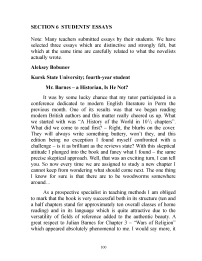Mr. Barnes - a historian, is he not?
Автор: Bobunov Aleksey
Журнал: Тропа. Современная британская литература в российских вузах @footpath
Рубрика: Student essays
Статья в выпуске: 1, 2008 года.
Бесплатный доступ
Короткий адрес: https://sciup.org/147228640
IDR: 147228640
Текст статьи Mr. Barnes - a historian, is he not?
SECTION 6 STUDENTS’ ESSAYS
Note: Many teachers submitted essays by their students. We have selected three essays which are distinctive and strongly felt, but which at the same time are carefully related to what the novelists actually wrote.
Aleksey Bobunov
Kursk State University; fourth-year student
Mr. Barnes - a Historian, Is He Not?
It was by some lucky chance that my tutor participated in a conference dedicated to modern English literature in Perm the previous month. One of its results was that we began reading modern British authors and this matter really cheered us up. What we started with was “A History of the World in 10V2 chapters”. What did we come to read first? - Right, the blurbs on the cover. They will always write something buttery, won’t they, and this edition being no exception I found myself confronted with a challenge - is it as brilliant as the reviews state? With this skeptical attitude I plunged into the book and fancy what I found - the same precise skeptical approach. Well, that was an exciting turn, I can tell you. So now every time we are assigned to study a new chapter I cannot keep from wondering what should come next. The one thing I know for sure is that there are to be woodworms somewhere around...
As a prospective specialist in teaching methods I am obliged to mark that the book is very successful both in its structure (ten and a half chapters stand for approximately ten overall classes of home reading) and in its language which is quite attractive due to the versatility of fields of reference added to the authentic beauty. A great respect to Julian Barnes for Chapter 3 - “Wars of Religion” which appeared absolutely phenomenal to me. I would say more, it just catered for my aesthetic taste by its breathtaking style and sarcasm, and excuse my sudden revelation, those diabolical bestioles along with the bishop reduced to the state of imbecility will dwell in my mind for years. However, I am bound to declare that personally I come to find a considerable amount of gloom mixed with cynicism as a relevant part of the book’s contents and I can’t say I feel really optimistic after a portion of this blend. Somehow when you are 20 you are still struggling to see more good and glorious in this sombre place, the Earth by name, and it is quite aggravating as it were to grasp the words of the Black Thunder freedom fighter group’s head: “...the world is not a cheerful place...”. And yet those minor faults - solely in my humble opinion, I’d like to accentuate this again - are overshadowed by a weighty argument which is paramount in estimation of every book - the thoughts. Julian Barnes wields a good command of reasoning, I admire his logic and paradoxes of life he presents, his keen doubting mind (doubt gives way to cynicism, though there still must be a gap between them) and the choice of events to describe the history of the world which is a hard job, taking into account thousands of years of history of the human kind. A history of the world, the article is pretty accurately used, meaning one of those possible. By the way, what could you write about? The World Wars, chronicles of religion, history of arts - all very generalized and impersonal; Julian Barnes undertook the opposite: history of the world as a story of particular individuals, grains of sand that become visible only as soon as you collect them all together. A nice angle of view, isn’t it? Neither of us treats the world in a general and objective way, we are all in possession of a personal prism through which we perceive things. Sounds perfectly reasonable, right? And here is Julian Barnes with his creation that appeals to every reader, should they adore or loathe it, none remains indifferent.


